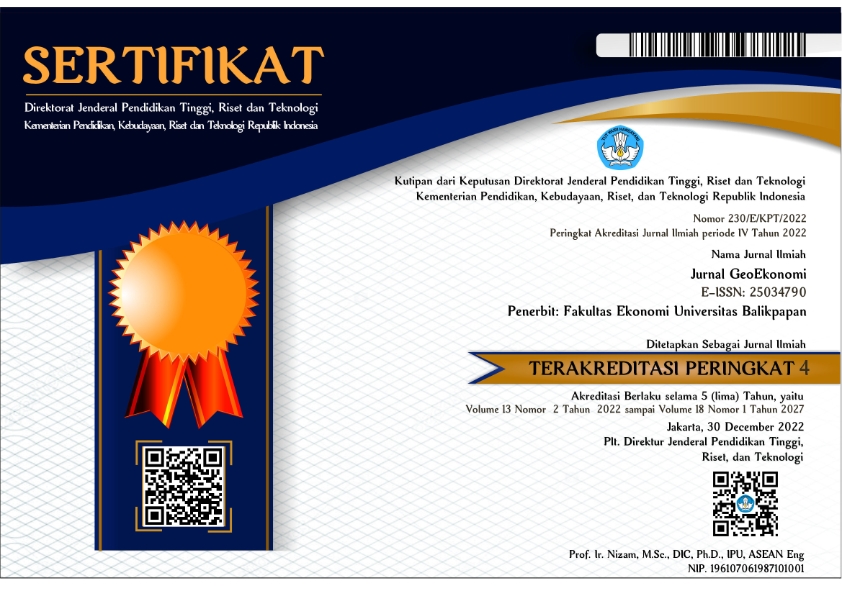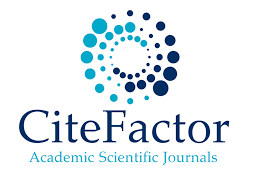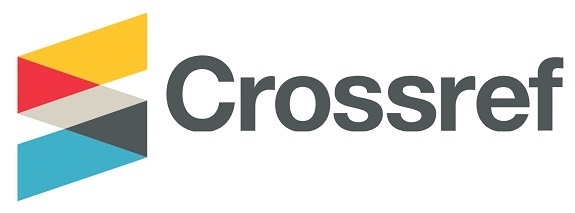IMPLIKASI FINANCIAL TECHNOLOGY, LITERASI KEUANGAN DIMEDIASI OLEH DIGITAL MARKETING TERHADAP KINERJA KEUANGAN UMKM
DOI:
https://doi.org/10.36277/geoekonomi.v16i1.575Keywords:
Fintech, Financial Literacy, Digital Marketing, MSMEsAbstract
This research aims to determine the direct effects that occur due to the existence of financial technology and financial literacy mediated by digital marketing on the financial performance of MSMEs in Samarinda City. This research uses quantitative descriptive research, and the nature of this research is explanatory research. The sample for this research is MSMEs in Samarinda City. The sampling technique uses a purposive sampling method. The data analysis used is SEM PLS (Partial Least Square) analysis. Primary data was obtained from distributing questionnaires with data collection techniques using questionnaires and documentation. The results of the research state that the relationship between fintech and positive financial performance has no significant effect, the relationship between financial literacy and positive financial performance has a significant effect, and digital marketing mediates fintech and financial literacy on financial performance positively and significantly. Digital marketing is 80% an influential and significant factor in financial performance, with 20% other variables.
Downloads
References
Abidin, M. (2015). Kebijakan dan Peningkatan Peran Ekonomi UMKM. Kemenkeu.Go.Id, 50-62.
Akhmad, D. (2021). Pengaruh Faktor Demografi, Locus of Control, Literasi Keuangan dan Inklusi Keuangan terhadap Kinerja Keuangan UMKM (Studi pada Pelaku UMKM di Wilayah Kota Banjar Patroman) . Jurnal Ilmiah Akuntansi Dan Keuangan, 170-18.
Ardila, I. d. (2021). Faktor-Faktor Yang Mempengaruhi Literasi Keuangan Pada Usaha Mikro Kecil Dan Menengah. Jurnal Prosiding Konferensi Internasional (Jicp), 144-149.
BI. (2015). Profil Bisnis Usaha Mikro, Kecil dan Menengah (UMKM). Jakarta: In Bank Indonesia dan LPPI.
Fadilah, I. (2022). Analisis pengaruh Literasi Keuangan, Inklusi Keuangan, dan Financial Technology terhadap kinerja Usaha Mikro Kecil Menengah (UMKM) di Kota Bandung. Fair Value:n. Jurnal Ilmiah Akuntansi Dan Keuanga, 1347–1354.
Mulyanti, D. &. (2022). Penerapan Literasi Keuangan Dan Penggunaan Financial Technology Untuk Menilai Kinerja Keuangan Umkm Di Jawa Barat. jurnal Ekono Insentif, 63–81.
OJK. (2016, Januari). OJK.Go.Id. Retrieved Januari 77, 2023, from https://www.ojk.go.id
OJK. (2017). Jakarta: ojk.
Ramadhanil, A. N. (2020). Pengaruh Literasi Keuangan Terhadap Perilaku Mahasiswa Dalam Mengelola Keuangan (Perbandingan Mahasiswa Bisnis Dan Mahasiswa Teknik Universitas Telkom). Jurnal Mitra Manajemen, 251-256.
Rizky, M. (2019). Identifikasi Tingkat Literasi Keuangan (Akuntansi) Umkm Pelaku Kawasan Lahan Basah (Studi Pada Pelaku Umkm Di Desa Pemakuan Kabupaten Banjar). Jurnal Internasional Akuntansi & Keuangan Di Asia Pasifik (Ijafap), 1 - 12.
Sanjaya, N. (2016). Inklusi Keuangan Dan Pertumbuhan Inklusif : Analisis Antar Provonsi Di Indonesia. Buletin Ekonomi Moneter dan Perbakan, 281-306.
Soetiono, K. S. (2018). LIterasi dan Inklusi Keuangan Indonesia. Raja Grafido Persada: Jakarta.
Sri, K. A. (2013). Tingkat Literasi Keuangan Di Kalangan Mahasiswa Stie Musi (Financial Literacy Level among Students Stie Musi. Jurnal Economia, 130–140.
Suci, Y. (2017). Perkembangan UMKM di Indonesia. Jurnal Ilmiah Cano Ekonomos, 51-58.
Sugiarti, D. M. (2019). Peran Fintech Dalam Meningkatkan Literasi Keuangan Pada UMKM Di Malang. E-JRA; 08 (4), 90-104.
Susanti, A. d. (2018). Tingkat Pendidikan, Literasi Keuangan, dan Perencanaan Keuangan terhadap Perilaku Keuangan UMKM di Surakarta. jurnal Telaah Bisnis, 45–56.
Sutrisno. (2015). Manajemen Keuangan Teori, Konsep, dan Aplikasi. Yogyakarta: EKON ISIA.
Suyanto, S. (2022). Faktor Demografi, Financial Technology, Dan Kinerja Keuangan Usaha Mikro Kecil Dan Menengah (Umkm): Inklusi Keuangan Sebagai Mediasi. Akuntansi Dewantara, 1–20.
Yuyun Yuniati Yuningsih1, G. R. (2022). Pengaruh Literasi Keuangan dan Financial Technology Terhadap Keberlangsungan Usaha Pelaku UMKM. Jurnal Mirai Management, 531–540.
Downloads
Published
How to Cite
Issue
Section
License
Copyright (c) 2025 Muhammas Astri Yulidar Abbas, Sri Wahyuti, Safrullah

This work is licensed under a Creative Commons Attribution 4.0 International License.
You are free to:
Share - copy and redistribute the materials in any medium or format for any purpose, even for commercial purposes.
Adapt - compose, change and develop the material for any purpose, even for commercial purposes.
The licensor cannot revoke these freedoms as long as you follow the license terms.
With the following conditions:
Attribution - you must give appropriate credit, provide a link to the license, and indicate if changes have been made. You may do so in a reasonable manner, but not in any way that suggests that the licensor endorses you or your use.
No additional restrictions - You may not implement legal provisions or technological measures that legally restrict others from doing anything permitted by the license.
Notice:
You do not have to comply with the license for elements of the material that are in the public domain or where your use is permitted by an applicable exclusion or restriction.
No warranties are given. This license may not grant all the permissions necessary for your intended use. For example, other rights such as publicity, privacy, or moral rights may limit how you use the material.







_geoekonomi.png)
_geoekonomi.png)
















